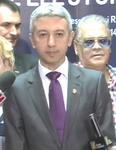Romanian legislative election, 2012
|
|
|||||||||||||||||||||||||||||||||||||||||||||||||||||||||||||||||||||||
|---|---|---|---|---|---|---|---|---|---|---|---|---|---|---|---|---|---|---|---|---|---|---|---|---|---|---|---|---|---|---|---|---|---|---|---|---|---|---|---|---|---|---|---|---|---|---|---|---|---|---|---|---|---|---|---|---|---|---|---|---|---|---|---|---|---|---|---|---|---|---|---|
|
|||||||||||||||||||||||||||||||||||||||||||||||||||||||||||||||||||||||
|
All 137 seats in the Senate All 315 seats in the Chamber of Deputies |
|||||||||||||||||||||||||||||||||||||||||||||||||||||||||||||||||||||||
| Turnout | 41.76% | ||||||||||||||||||||||||||||||||||||||||||||||||||||||||||||||||||||||
|
|||||||||||||||||||||||||||||||||||||||||||||||||||||||||||||||||||||||
|
|||||||||||||||||||||||||||||||||||||||||||||||||||||||||||||||||||||||
Legislative elections were held in Romania on 9 December 2012. The Social Liberal Union of Prime Minister Victor Ponta won an absolute majority in both the Chamber of Deputies and the Senate. Despite the severe weather in parts of the country, the turnout was at 41.7%, higher than the last legislative elections held in 2008 which saw a presence of 39.20%.
The Social Liberal Union obtained a huge majority in both the Chamber of Deputies and the Senate, with 60.07% and 58.61% of the votes respectively and in MP mandates, a record number of 395 seats. Far behind, the Right Romania Alliance came in second place with only 16.72% and 16.52% of the votes and 80 seats, losing about half of what they won in 2008. The Right Romania alliance officially dissolved after the election.People's Party – Dan Diaconescu and Hungarian Democratic Union of Romania were the only other political groups that won seats in the Senate. Several parties for ethnic minorities also received individual seats in the Chamber of Deputies.
Following weeks of demonstrations against austerity measures demanded by the International Monetary Fund for a multi-billion US dollar loan, Prime Minister Emil Boc resigned from his post on 6 February 2012. The opposition, represented by Social Liberal Union leaders Victor Ponta and Crin Antonescu, then called for early elections. However, as the three parties behind the government (PDL, UDMR, UNPR) still relied on a slight parliamentary majority, an interim solution was agreed with the opposition that the government could stay in power until the next elections, conditional of electing a political independent technocrat as the new prime minister. The former Foreign Intelligence Service Director Mihai Răzvan Ungureanu was appointed interim prime minister on 9 February as a result.
...
Wikipedia




